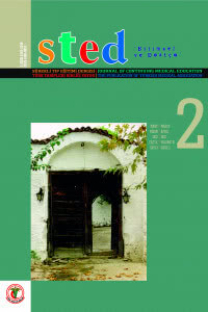Gebelikte Bilgi İhtiyacının Karşılanmasında İnternetin Rolü
The Role of the Internet in Meeting the Need for Information during Pregnancy
___
- 1. Kahraman S, Kabalcıoğlu F, Ersin F. Şanlıurfa’daki gebelerin bebek bakımına ilişkin bilgi düzeyleri. Sos Polit Çalışmaları Derg. 2016;(36):79–97.
- 2. Balay R. Küreselleşme, bilgi toplumu ve eğitim. Ankara Üniversitesi Eğitim Bilim Fakültesi Derg. 2004;37(2):61–82.
- 3. Bayar F. Küreselleşme kavramı ve küreselleşme sürecinde Türkiye. Uluslararası Ekon Sorunlar Derg. 2008;XXXII:25–34.
- 4. Oral B, Kenanoğlu R. web tabanlı uzaktan eğitim sistemlerinin öğrenci başarısına ve bilgisayara yönelik tutumlarına etkisi. Elektron Eğitim Bilim Derg. 2012;1(2):23–36.
- 5. Cole JI, Suman M, Schramm P, Zhou L. The World Internet Project International Report. United States; 2017. Erişim Tarihi:10 Kasım 2018. Erişim Adresi: www.digitalcenter.org
- 6. Türkiye İstatistik Kurumu. Hanehalkı Bilişim Teknolojileri Kullanım Araştırması, 2017. Türkiye İstatistik Kurumu. 2017. Erişim Tarihi: 15 Ekim 2018. Erişim Adresi: http://www.tuik.gov.tr/PreHaberBultenleri.do?id =24862
- 7. Demiryay A. Gebe kadınların algıladıkları fiziksel ve emosyonel yakınmalar. Afyon Kocatepe Üniversitesi Sağlık Bilimleri Enstitüsü; 2006.
- 8. Batman D. Gebe kadınların gebelikleriyle ilgili araştırdığı konular ve bilgi kaynakları; nitel bir çalışma. Kocaeli Üniversitesi Sağlık Bilim Derg. 2018;4(3):63–9.
- 9. Grimes H, Forster D, Newton M. Sources of information used by women during pregnancy to meet their information needs. Midwifery. 2014;30(1):26–33.
- 10. Sönmez Y. Doğum öncesi bakım hizmetleri. Sürekli Tıp Eğitimi Derg. 2007;16(1):9–12.
- 11. T.C. Sağlık Bakanlığı Halk Sağlığı Kurumu. Doğum öncesi Bakım Yönetim Rehberi 2014. Ankara; 2014. 1-27 s. Erişim Tarihi: 20 Mayıs 2017. Erişim Adresi: http://sbu.saglik.gov.tr/Ekutuphane/kitaplar/dog umonubakim.pdf
- 12. Hacettepe Üniversitesi Nüfus Etütleri Enstitüsü, Türkiye Nüfus ve Sağlık Araştırması, 2013.
- 13. Çatak B, Davas-Aksan A, Zincir M. Karabük toplum sağlığı merkezi bölgesinde doğum öncesi bakım hizmetlerinin nicelik ve niteliği. TAF Prev Med Bull. 2012;11(2):153–162.
- 14. İnce T, Kondolot M, Yalçın SS, Yurdakök K. Annelerin emzirme danışmanlığı alma durumları. Çocuk Sağlığı ve Hast Derg. 2010;53(3):189– 197.
- 15. Gao L, Larssons M, Luo S. Internet use by Chinese women seeking pregnancy-related information. Midwifery. 2013;29(7):730–735.
- 16. Larsson M. A descriptive study of the use of the Internet by women seeking pregnancy-related information. Midwifery. 2009;25(1):14–20.
- 17. Bjelke M, Martinsson AK, Lendahls L, Oscarsson M. Using the Internet as a source of information during pregnancy — A descriptive cross-sectional study in Sweden. Midwifery. 2016;40:187–191.
- 18. Lima-Pereira P, Bermúdez-Tamayo C, Jasienska G. Use of the Internet as a source of health information amongst participants of antenatal classes. J Clin Nurs. 2012;21(3–4):322–330.
- 19. Kavlak O, Atan ŞÜ, Güleç D, Öztürk R, Atay N. Pregnant women’s use of the internet in relation to their pregnancy in Izmir, Turkey. Informatics Heal Soc Care. 2012;37(4):253–263.
- 20. De Santis M, De Luca C, Quattrocchi T, Visconti D, Cesari E, Mappa I, vd. Use of the Internet by women seeking information about potentially teratogenic agents. Eur J Obstet Gynecol Reprod Biol. 2010;151(2):154–157.
- 21. Huberty J, Dinkel D, Beets MW, Coleman J. Describing the use of the internet for health, physical activity, and nutrition information in pregnant women. Matern Child Health J. 2013;17(8):1363–1372.
- 22. O’Higgins A, Murphy O, Egan A. The Use of Digital Media by Women Using the Maternity Services in a Developed Country. Ir Med J. 2014;107(10):313–315.
- 23. Lagan BM, Sinclair M, Kernohan WG. Internet Use in Pregnancy Informs Women’s Decision Making : A Web-Based Survey. Birth. 2010;37(2):106–115.
- 24. Bert F, Gualano MR, Brusaferro S, De Vito E, de Waure C, La Torre G, vd. Pregnancy e-health: A multicenter Italian cross-sectional study on internet use and decision-making among pregnant women. J Epidemiol Community Health. 2013;67(12):1013–1018.
- 25. Kim TH, Lee HH, Chung SH. The attitude of South Korean people regarding usage of the internet perinatal consultation. Int J Fertil Steril. 2014;8(3):299–302.
- 26. Funnell G, Naicker K, Chang J, Hill N, Kayyali R. A cross-sectional survey investigating women ’ s information sources , behaviour , expectations , knowledge and level of satisfaction on advice received about diet and supplements before and during pregnancy. BMC Pregnancy Childbirth. 2018;18(182):1–10.
- 27. Navaro M, Vezzosi L, Santagati G, Angelillo IF. Knowledge , attitudes , and practice regarding medication use in pregnant women in Southern Italy. PLoS One. 2018;13(6):1–14.
- 28. Kamali S, Ahmadian L, Khajouei R, Bahaadinbeigy K. Health information needs of pregnant women : information sources , motives and barriers. Heal Inf Libr J. 2017;35(1):24–37.
- 29. Hamzehei R, Kazerani M, Shekofteh M, Karami M. Online health ınformation seeking behavior among Iranian pregnant women : a case study. Libr Philos Pract. 2018;(February):1–16.
- 30. Sinclair M, Dolk H, Mccullough JEM. An assessment of pregnant women ’ s knowledge and use of the Internet for medication safety information and purchase. J Adv Nurs. 2018;74(1):137–47.
- ISSN: 1300-0853
- Yayın Aralığı: 6
- Başlangıç: 1992
- Yayıncı: -
Gebelerin Oral Gluikoz Tolerans Testi (OGTT) Yaptırma Durumlarına Medyanın Etkisi
Arzu ÇAKIR, Kıymet YEŞİLÇİÇEK ÇALIK
İsmet DEMİRTAŞ, Sevilay AYYILDIZ, Behçet AYYILDIZ, Koral Çağlar KUŞ
Gebelikte Bilgi İhtiyacının Karşılanmasında İnternetin Rolü
Ebru CİRBAN EKREM, Sevgi ÖZSOY
Tugba Yılmaz ESENCAN, Ayça DEMİR YILDIRIM
Adölesan Çağ Öğrencilerin Diyabet Bilgi ve Farkındalık Düzeylerinin Değerlendirilmesi
YELİZ MERCAN, Sünbül Hülya ARIKAN, Ebru DERELİ, Nüket PANCAR
Tarihsel/Toplumsal Travmalar ve Kuşaklararası Aktarımı Biçimleri Üzerine
Fazla Kilo Riski Olan Çocuklarda Vitamin D Düzeylerinin Değerlendirilmesi
Beril ÖZDEMİR, Sıdıka Songül YALÇIN
